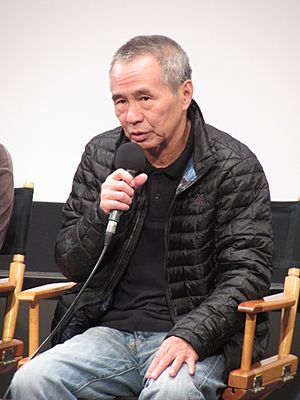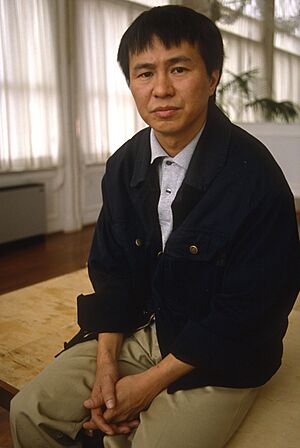Hou Hsiao-hsien facts for kids
Quick facts for kids
Hou Hsiao-hsien
|
|||||||||||||||||||||
|---|---|---|---|---|---|---|---|---|---|---|---|---|---|---|---|---|---|---|---|---|---|

Hou at a screening of The Assassin at the Cinémathèque Française, 2016
|
|||||||||||||||||||||
| Born | 8 April 1947 Meixian County, Guangdong, Republic of China
|
||||||||||||||||||||
| Occupation | Film director Screenwriter Producer Actor |
||||||||||||||||||||
| Spouse(s) | Tsao Pao-feng | ||||||||||||||||||||
| Children | 1 | ||||||||||||||||||||
| Awards | Golden Lion : 1989 A City of Sadness Jury Prize (Cannes Film Festival) : 1993 The Puppetmaster Leopard of Honour : 2007 Best Director Award (Cannes Film Festival) : 2015 The Assassin Golden Horse Awards – Best Feature Film 2015 The Assassin Best Adapted Screenplay 1983 Growing Up 1984 Ah Fei Best Original Screenplay 1985 The Time to Live and the Time to Die Best Director 1989 A City of Sadness 1995 Good Men, Good Women 2015 The Assassin Best Taiwanese Filmmaker of the Year 2005 Three Times 2015 The Assassin Lifetime Achievement Award 2020 |
||||||||||||||||||||
| Chinese name | |||||||||||||||||||||
| Traditional Chinese | 侯孝賢 | ||||||||||||||||||||
| Simplified Chinese | 侯孝贤 | ||||||||||||||||||||
|
|||||||||||||||||||||
Hou Hsiao-hsien (born April 8, 1947) is a famous retired film director from Taiwan. He is known around the world for his beautiful and thoughtful movies. Hou was a key figure in a movement called the Taiwan New Wave. This was a group of filmmakers who wanted to tell realistic stories about the lives of people in Taiwan.
He has won many major awards for his work. In 1989, he won the Golden Lion, the top prize at the Venice Film Festival, for his movie A City of Sadness. In 2015, he was named Best Director at the Cannes Film Festival for The Assassin. Critics have called him one of the most important directors of our time.
Contents
Life and Career
Hou Hsiao-hsien was born in Guangdong, a province in mainland China, in 1947. His family moved to Taiwan a year later when his father got a government job there. Hou grew up in Taiwan and later studied at the National Taiwan Academy of the Arts.
Becoming a Famous Director
In the early 1980s, Hou started directing his own films. He became a leading part of the Taiwan New Wave. These filmmakers made movies that were different from the action films and romantic comedies that were popular at the time. They focused on realistic stories about family, history, and growing up in Taiwan.
Many of Hou's early films, like The Boys from Fengkuei (1983) and A Summer at Grandpa's (1984), are about young people figuring out their place in the world. These films were praised for their honest and gentle look at life.
International Success
Hou became world-famous with his 1989 film A City of Sadness. This was a very important movie because it was one of the first to talk about a difficult time in Taiwan's history called the February 28 Incident. This event had been a forbidden topic for many years. The film tells the story of a family living through the political changes after World War II. It won the top prize at the Venice Film Festival, which was a first for a Taiwanese film.
He continued to make highly respected films, including The Puppetmaster (1993), which tells the life story of a famous Taiwanese puppet master, and Flowers of Shanghai (1998), a beautiful film set in the 1880s.
His Unique Filmmaking Style
Hou Hsiao-hsien is known for a special way of making movies. His style is often described as quiet and observant.
- Long Takes: He often uses very long shots where the camera doesn't move much. Instead of cutting quickly from one shot to another, he lets the scene play out. This makes the audience feel like they are right there, watching the events happen in real time.
- Realistic Acting: Hou encourages his actors to perform in a very natural way. He often lets them improvise, or make up their lines, to make the scenes feel more real.
- Telling Stories Indirectly: He doesn't always explain everything directly. He uses images and quiet moments to show how characters are feeling. This makes the audience think more deeply about the story.
Major Films
Over his career, Hou directed 18 feature films. While all are important, a few stand out for their impact.
The "Coming of Age" Trilogy
This group of films explores what it's like to grow up. It includes A Summer at Grandpa's (1984), The Time to Live and the Time to Die (1985), and Daughter of the Nile (1987). A Time to Live, A Time to Die is based on Hou's own childhood and is considered one of his best early works.
The "Taiwan Trilogy"
These three films look at important moments in Taiwan's history during the 20th century.
- Dust in the Wind (1986) is about a young couple who moves from their village to the city.
- A City of Sadness (1989) deals with the arrival of the Chinese Nationalist government in Taiwan.
- The Puppetmaster (1993) tells the story of Taiwan during the 50 years it was ruled by Japan, through the eyes of a puppeteer.
The Assassin (2015)
This was Hou's last feature film and one of his most famous. It is a martial arts film, but it is very different from typical action movies. It is known for its stunningly beautiful shots and quiet, thoughtful story. The film is about a female assassin in 9th-century China who is sent to kill a man she was once supposed to marry. The Assassin won Hou the Best Director award at the Cannes Film Festival.
Other Work in Film
Besides directing, Hou was involved in movies in many other ways. He wrote or co-wrote 21 films, including the famous movie Taipei Story (1985), which was directed by his friend Edward Yang.
He also worked as a producer, helping other filmmakers get their movies made. One of the most famous films he produced was Raise the Red Lantern (1991), a major international hit from Chinese director Zhang Yimou. Hou also acted in a few films, including playing the main character in Taipei Story.
Personal Life
Hou is married to Tsao Pao-feng, and they have one daughter. He has said that because he was born in mainland China, he has always felt a connection to Chinese culture.
In October 2023, it was announced that Hou Hsiao-hsien had retired from filmmaking because he was battling Alzheimer's disease. His work continues to influence filmmakers in Taiwan and all over the world.
See also
 In Spanish: Hou Hsiao-Hsien para niños
In Spanish: Hou Hsiao-Hsien para niños
 | Janet Taylor Pickett |
 | Synthia Saint James |
 | Howardena Pindell |
 | Faith Ringgold |


